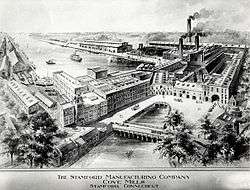Cove Island Park

Cove Island Park is an 83-acre park and beach in the Cove section of Stamford, Connecticut, located on Long Island Sound. It is a popular spot for Stamford residents to rollerblade, bike, walk, barbecue, and ride the tram around the island.
The city’s Park Commission has loosened and restricted park access to out-of-town visitors over time. As of summer 2014, Stamford residents with valid Stamford car registrations can buy a season pass for $20 at Government Center. Non-residents and non-pass holders pay $20 for a day pass.
Geography
The area known as the Cove consists of the peninsula bordered by on the west by the Shippan neighborhood of Stamford and on the east by Holly Pond, which, along with the Noroton River, divides Stamford from Darien, Connecticut. Cove Island is detached from shore on the East end of the Cove. It is linked to the mainland by two bridges, one of which is accessible by motor vehicles. The park’s parking lot is located on the Cove peninsula, across from Cove Island, and the western part of the park surrounds the parking lot.
The park contains a diversity of habitats: roughly 30% estuary, 20% pond/lake, 10% deciduous forest, 10% shrub, 10% grassland, 10% salt marsh, 5% field, and 5% non-tidal freshwater marsh.[1]
History
Cove Island became separated from the mainland after a flour watermill was expanded by its owners in the late 1700s. Ownership of the land transferred to Henry J. Sanford in the late 1830s, who founded Stamford Manufacturing Co. in 1844, which operated the Cove’s mills and manufactured dye extracts, bleached minerals, licorice. The factory on Cove Island stayed in business until 1919, when it burned down, with the Stamford Advocate calling it the most damaging fire in city history.
Over time, the island was converted to a park by the City of Stamford, with the United States Army Corps of Engineers developing the island’s beach in the late 1950s.
The park was flooded during Hurricane Sandy in 2012, with Stamford's parks and beaches suffering $2.5 million in total damages from the storm.[2] The City of Stamford and conservation groups have worked with national experts on a comprehensive long-term plan for the park in light of environmental risks.
Facilities
Since 2000 the park has been the headquarters of SoundWaters, a nonprofit environmental education organization that offers a free small aquarium, music, canoe trips, school trips, and family activities on land and aboard an 80-foot (24 m) schooner.
Outside the park's entrance is the Terry Conners Ice Rink, where children may skate in the winter, take skating lessons, or reserve the rink for special occasions.
After many years of effort and repairs the tract of land behind and around Terry Conners Rink has been turned into an Important Bird Area (IBA) -- one of the first eight IBAs in Connecticut. Inside the sanctuary entrance, visitors find an information kiosk featuring brochures, seasonal photos of flora and fauna, and a chalkboard to share new bird sightings. Beyond the kiosk is a 5-acre (20,000 m2) native grass and wildflower meadow encircled by a handicap-accessible visitors' path that leads to a beach-side viewing area from which visitors can observe shorebirds without encroaching upon Stamford's last undeveloped sand dune. The meadow path connects to a rugged trail which winds through woods along the west border of the park. To date, sightings of close to 300 bird species have been recorded in the park area.
Trivia
The movie Reservation Road was filmed at the park, including the opening scene of an outdoor concert and a climactic scene near the end. Weed Avenue, just north of the park, was used in two scenes where a character jogs.
References
External links
- Cove Island Park - City of Stamford
- Famous Cove Mills Perish in Stamford's Biggest Fire Article on manufacturing at the site of Cove Island Park (Stamford Historical Society newsletter)
Coordinates: 41°02′49″N 73°30′05″W / 41.0470°N 73.5013°W